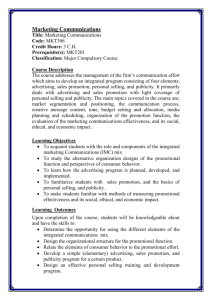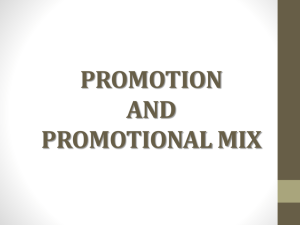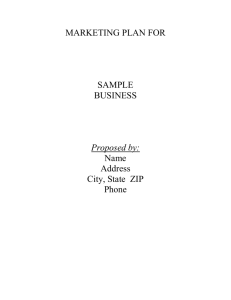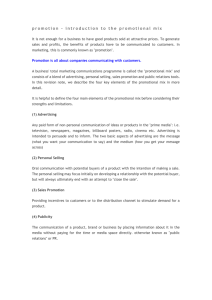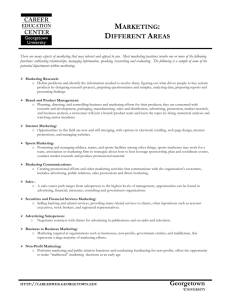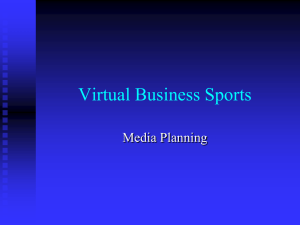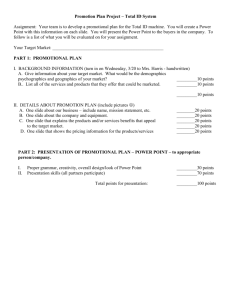Integrated Marketing Communications (IMC)
advertisement
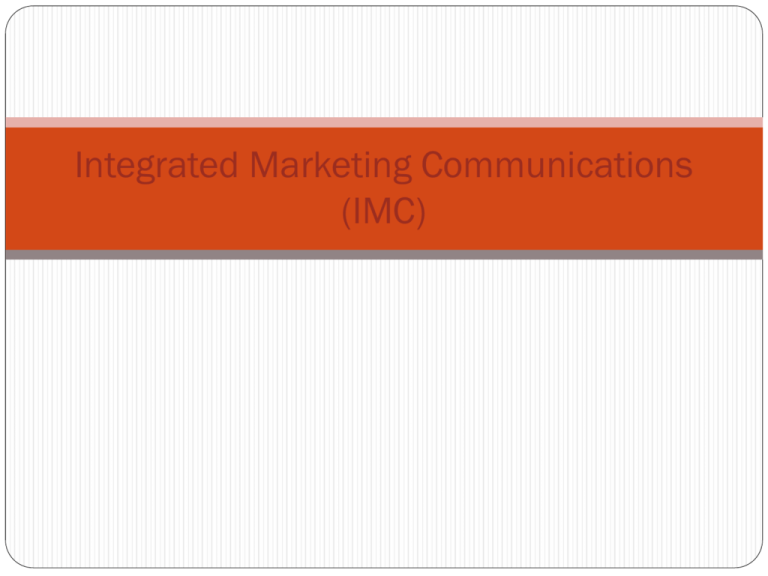
Integrated Marketing Communications (IMC) Context Overall Marketing Objectives Marketing Mix • Product • Distribution • Promotion • Price Target Market Promotional Mix •Advertising •Public Relations •Personal Selling •Sales Promotion Promotion Plan Coordinated; Competitive Advantage Promotion & Marketing Communications • Promotion: function of informing, persuading, and influencing the consumer’s purchase decision Goals of Promotion Inform: this is what we offer (especially new, car financing) Persuade: we are better (Kia & Honda) (similar to competition) Remind: have them already (well established with loyal base; JC Penney) Integrated Marketing Communications Marketing Communications: transmission from a sender to a receiver of a message dealing with the buyer-seller relationship Integrated marketing communications (IMC): Coordination of all promotional activities to produce a unified customer-focused promotional message Success of any IMC program depends critically on identifying the members of an audience and understanding what they want Precondition for promotion: communication Source Encoding Process Medium of Transmission Decoding Process Receiver or Audience Feedback NOISE NOISE AIDA concept Marketing Communication Process Need common frame of reference b/w sender and receiver to exchange meanings (Language, impairment) 5 Step Process: 1. Source/Sender Ad agency Intends to share meaning 2. Encoding: translating meaning of message into some form (Got Milk?) Marketing Communication Process 3. Message Channel / Medium: Means of reaching target (print ad, T.V., salesperson) Be appropriate (print vs. T.V.; Newsweek vs. Playboy) 4. Decoding the Message Target makes sense of message Noise: anything decreases clarity (e.g., Nova; KFC in Japan) Message always changes (teaching) 5. Receiver: decoder of message (different markets see same message differently). What examples can you think of? Feedback is response: circular Difficult to measure, so use feedback channels (research, sales) AIDA: Attention? Attention-> Interest-> Desire ->ACTION!!! It gets harder as you go…. Attention (e.g., sign-flippers, clowns) Headline (New York Post; only part read) Visuals (sex) Layout Colors Size (Times Square) Electronic: sound; music; animation Gross images (this nasty eyeball gets your attention!) AIDA: Interest? Keep Interest – difficult in “our ADD world” Tactics: Drama/story (Dos Equiss ) Cartoons (M&Ms) Dialog (it’s a Diet Coke Thing; Wusssssup?) Doritos Commercial: What tactics do they attempt to hold your interest? http://www.youtube.com/watch?v=v5lBdLEi3ns AIDA: Desire? Arouse desire Tactics: USP: Unique selling proposition (Gillette razor; clear deodorant, clear soda) Provide a rationale (“I’m worth it”) Address “you” with their needs/problems (“Do you want to make more $?”; “Have you been injured in an accident?”) Federal Express: When it absolutely, positively has to be there overnight. AIDA: Action? Action – if consumers’ desire, hope action is natural (and realistic for them): Ask consumers to do something (log on to…; call..) Imperative: “Drink Coke,” “Fly the Friendly Skies” Facilitate: 1-800 or web Direct competitive: supplies are limited!! Do you view ads after purchasing that product?: Why? Promotional Mix UNPAID NONPERSONAL PERSONAL Publicity PAID Advertising, Sales Promotion, Direct Marketing Word of Mouth, Direct Mail; Word of Mouse Personal Selling PromotionalTool: Advertising Promotion Methods a.k.a. The Promotion Mix Advertising: paid, impersonal promotions by identified sponsor(s) Traditional big markets, but adaptable to smaller Low cost/contact (LA Times: 2 cents/per reader) Difficult to measure impact Not adaptable, inflexible Promotional Tool: Publicity and The Media Publicity; unpaid, impersonal promotions (talk show, movie premiere, charity, cars) Do not pay media costs (magazine article) Perceived credibility; negativity Publicity has far more value than advertising, but you must give reporters a reason to write about you. Promotional Tool: Sales Promos Sales promotion (coupons, POP, samples, tradeshow) Added value or incentive in regard to a particular product May complement personal and mass selling (bonus) Targets Final consumers: coupons, freq. shopper Middleman: gifts, price breaks Company sales force: bonuses, training Promotional Tool: WOM/eWOM Word of mouth: “WOM is the most important marketing element that exists” Gordon Weaver, Paramount Pictures. Do you agree? Unpaid, personal promotions (after ads – PLC) Very high credibility (friends, business acquaintances, employees) Try for opinion leaders (may pay to stimulate; teens; movies; fashions) Usually negative (respond to complaints) Buzz; viral (snakes on a plane) Promotional Tool: Personal Selling Personal selling; paid, personal promotions; direct spoken communication Adaptable to each target Immediate feedback Very expensive ($200/contact, $500 on a cold market) More spending on p.s. than ads Factors Affecting Promotional Mix Nature of Product Stage in the PLC (When should you promote?) Target Market Characteristics Type of Buying Decision (Impulse?) Available Funds (Do you want a Bentley?) Promotion Mix Over the PLC Introduction Industry Sales Maturity Decline Advertising PR; Selling Advertising PR; Selling; Promotions Dollars Growth Publicity Advertising 0 Time Advertising Promotions; Selling Summary Marketing Mix/Toolkit Promotion Objectives Marketing Communication Process AIDA Factors Impacting Promotional Mix IMC Any questions??
